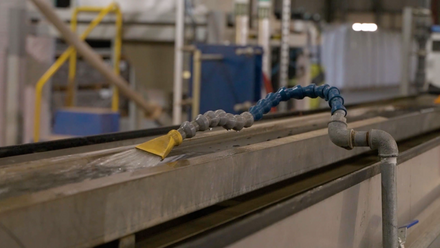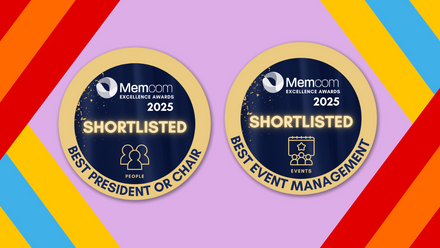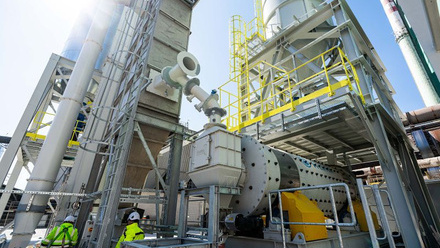Reimagining materials
David Elson, Head of Materials and Manufacturing at Innovate UK, dissects the organisation’s materials and manufacturing vision.

It is a critical and exciting time for the materials industry. The rapid discovery, broad adoption and efficient processing of advanced and sustainable materials underpin decarbonised economies and are critical to strengthen resilience in supply chains.
To enable this transition, material discovery, development and processing needs to be more agile and sustainable, and offer new functionalities to create novel products at lower cost. Design and manufacturing approaches will need to adopt new materials to optimise their application.
The government’s vision is for the UK to be a global hub for innovation by 2035. To deliver this, Innovate UK’s mission is to help businesses grow through their development and commercialisation of new products, processes and services, supported by an innovation ecosystem that is agile, inclusive and easy to navigate.
Our approach is built on five strategic themes – future economy, growth at scale, global opportunities, innovation ecosystem and government levers – and a set of strong foundations that underpin all our activities.
Last year, we published the Innovate UK materials and manufacturing vision 2025. It is a complete reimagination of the role of materials and manufacturing within our economy and society. The vision proposes an aspirational and realistic future in which the UK has clear potential to become a world-class destination of choice for advanced low-carbon manufacturing.
The overarching premise of this long-term vision is that UK materials and manufacturing organisations will be internationally competitive by meeting three strategic imperatives, namely:
- Net-zero and resource efficient – by understanding our environmental resources and the impact of every stage in the supply chain and manufacturing process, and widely adopting sustainable practices.
- Resilient and responsive – with the agility to mitigate risks arising from the changing global economy, interruptions to critical minerals and materials supply, national and global disruptions, and climate change.
- Technologically advanced – to improve efficiency across supply chains, enable novel business models, support whole-system design and deliver highly customised products.
The work addresses certain questions:
- What are the future materials for new applications and cutting-edge products that reduce emissions, energy consumption and costs?
- How to design smarter for resource efficiency and maximum through-life value including engineering biology?
- How to ensure resilient supply chains of sustainable feedstocks, bio-based chemical replacements and waste-to-worth?
- How to advance world-class production for high-quality products, high productivity, biomanufacture and full adaptivity?
- How do we keep products in use for longer, reuse materials more effectively and establish new remanufacturing services?
The vision also sets out how we can enable the sectors through a decarbonised, affordable and secure energy system; a trusted regulatory framework, and agile and forward-looking standards; courageous leadership and critical skills foresighting, upskilling and attraction; collaborative networks, open knowledge-sharing platforms and aligned investment; and innovative business models, agility to meet demand and green financing.
This systems-based approach provides a comprehensive and sector-agnostic overview that allows us to consider the interdependencies and links between the areas.
The specific vision is that 'materials, associated processing and new material applications will be the basis for cutting-edge products that reduce emissions, energy consumption and costs for UK manufacturing'.
Report and strategy analysis, along with consultation with multiple stakeholders, gathered information that has been condensed into four innovation strands to achieve the three strategic imperatives.
- Materials science and engineering underpin manufacturing – new products and coatings are developed alongside new processes to produce novel materials. This needs to be supported and incentivised by a dynamic policy framework alongside advocacy for the importance of materials.
- The development of materials for sustainable products – the design and use of consumer goods and packaging needs to be transformed. Key examples include industrial biotechnology, material business models for circularity and the replacement of fossil-based feedstocks.
- New material applications are broadly adopted – processes need to be in place to characterise materials to ensure that data is widely available to support decisions for new material applications.
- New materials discovered more rapidly – materials informatics, including machine learning tools and techniques, and physics-based modelling to accelerate the discovery and development of new and functional materials.
- Resource efficiency for materials and manufacturing – the programme aims for the UK to be a leader in resource efficiency, with organisations understanding the environmental, social and economic impact of the full lifecycle and thriving from resource-efficient solutions being adopted.
- Sustainable bio-based materials and manufacture – a joint programme between Innovate UK, the Biotechnology and Biological Sciences Research Council, and the Engineering and Physical Sciences Research Council, all part of UK Research and Innovation.
Innovate UK Business Connect is in place to connect innovators with new partners and new opportunities, accelerating ambitious ideas into real-world solutions. Additionally, Innovate UK Business Growth seeks to empower innovation-driven businesses to grow at pace. This includes supporting access to Horizon Europe and bilateral programmes.
As organisations embrace materials advances, they unlock opportunities for novel applications, enhanced functionality and, ultimately, a more prosperous and sustainable future.







